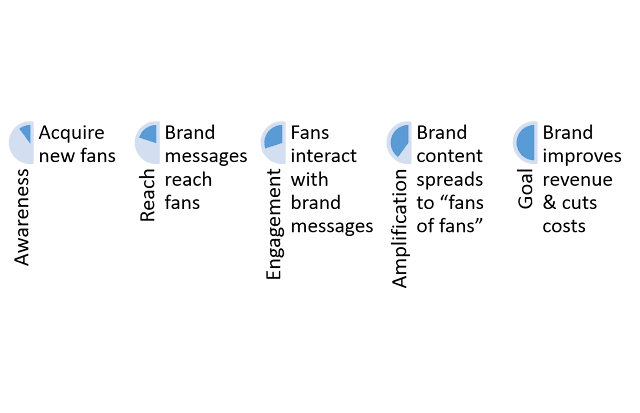General Motors famously pulled their $10 million dollar budget last year on the even of Facebook’s rocky IPO.
Many (including Wall Street) thought this was a knock on Facebook’s advertising options. But Facebook provides a lot of interesting options that work well for most businesses.
The problem with social media marketing is that it’s extremely easy to get tunnel vision. Every other article and news story gushes over some minutia that rarely warrants the excitement.
Instead, it’s more helpful to look at everything from 30,000 feet and see how all the pieces fit together. How are we combining earned, owned, and paid to create a seamless consumer experience?
So here are three possible reasons why your Facebook marketing might be failing, and how to fix it.

Possible Reason #1: Your Strategy is Lopsided
It’s easy to get stuck in a rut. Or stay in our comfort zone and not branch out to try new things.
One of the most common Facebook marketing mistakes is become too tactical, and forget the big picture. Then it’s easy to over do it in one area, while not doing enough in another.
For example, a successful Facebook marketing strategy incorporates several different things:

It’s easy to get tunnel vision and focus exclusively on engagement. Or we can get impatient and try to skip ahead to our Goal (i.e. improving revenue or cutting costs). But the best long-term strategy features each stage and provides a cohesive user experience from beginning to end.
The good news (and bad news) is that there’s no correct answer here. It takes some work in each area to succeed. But there’s no “guide” to follow, because each step is a little different for each business and customer type.
The important part is to take a step back, get out of the weeds, and see the forest through the trees.
Possible Reason #2: Low-to-No Engagement
Facebook’s EdgeRank was designed specifically to prevent brands from spamming their friends and fans. And it’s also the main reason why you have trouble reaching anyone at all.
Because chances are, if you can’t reach enough fans, then you won’t be able to drive websites visits, new leads, or any other business objectives you desire.
And the simple reason is because you don’t have enough people talking about your page. This little weekly measurement correlates perfectly with your viral reach:

Why obsess over engagement in social media? This is why. Because you need engagement to increase reach, and improve your odds of completing some marketing KPI.
Which brings us to our last point.
Possible Reason #3: You’re Prioritizing the Wrong Things
David Meerman Scott recently opened up about his battles with weight over the years, and had this to say about how he finally lost 50 lbs. and has kept it off:
When I measured just on my weight, I couldn’t lose weight. No matter what I did I stayed basically the same.
However, when I measured different things such as bodyfat percentage, metabolic age, calories burned, and the foods I eat, I changed my behaviors leading directly to weight loss.
His incredible insight can be applied to most things in life — including social media marketing.
We pay too much attention to the outcome (i.e. weight on a scale, or total Facebook Likes), and not enough on the process (i.e. the food choices through-out the day, or the types of content updates we’re sending each day).
So total fans and new likes are a good start. But there are often better things we should be paying attention to (like the “People Talking About This” mentioned a second ago).
Another great example is to track the ratio of “People Talking About This” to total page “Likes”.
These are much better KPI’s, and they’re actionable — meaning we can take specific daily actions to improve them and therefore improve the outcome (i.e. more business leads and sales)
What we focus on, expands. If we prioritize total likes, then we’ll get total likes.
But what about the other steps? What about the other objectives from #1 above like engagement, reach, amplification, or our business goal?
The best marketing strategies make sure that the whole is greater than the sum of it’s parts. That no piece is left out or ignored.
Because otherwise it will create inconsistent experiences for consumers, which creates inconsistent results for your business.
And inconsistencies make it impossible to predict, plan, or continue to invest more time and money.


